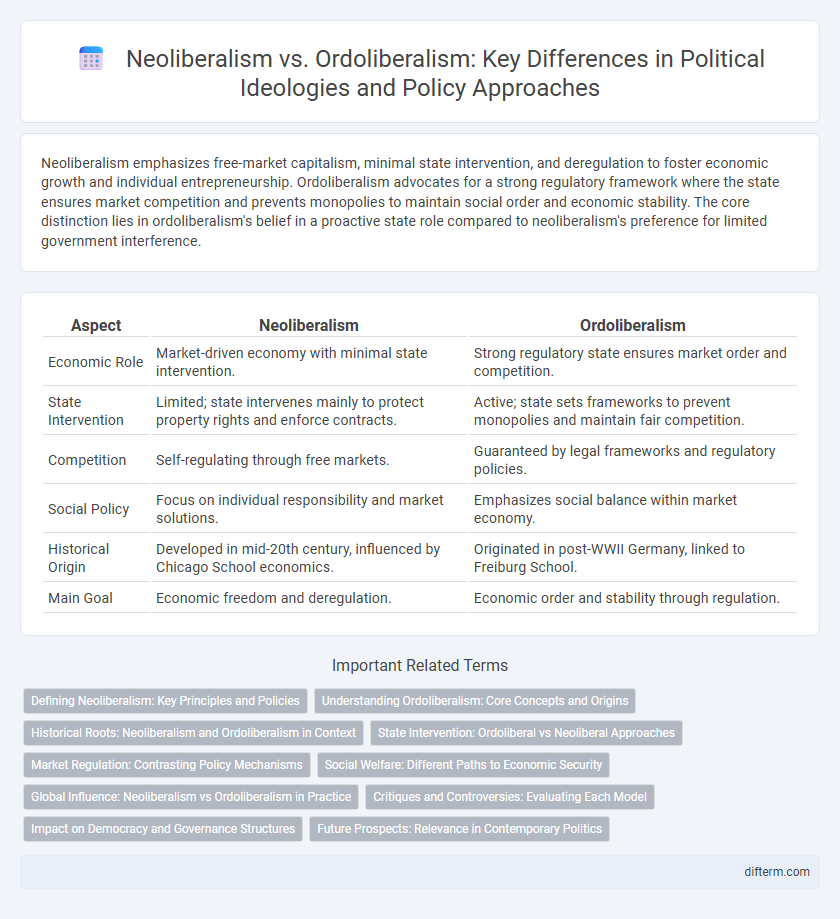Neoliberalism emphasizes free-market capitalism, minimal state intervention, and deregulation to foster economic growth and individual entrepreneurship. Ordoliberalism advocates for a strong regulatory framework where the state ensures market competition and prevents monopolies to maintain social order and economic stability. The core distinction lies in ordoliberalism's belief in a proactive state role compared to neoliberalism's preference for limited government interference.
Table of Comparison
| Aspect | Neoliberalism | Ordoliberalism |
|---|---|---|
| Economic Role | Market-driven economy with minimal state intervention. | Strong regulatory state ensures market order and competition. |
| State Intervention | Limited; state intervenes mainly to protect property rights and enforce contracts. | Active; state sets frameworks to prevent monopolies and maintain fair competition. |
| Competition | Self-regulating through free markets. | Guaranteed by legal frameworks and regulatory policies. |
| Social Policy | Focus on individual responsibility and market solutions. | Emphasizes social balance within market economy. |
| Historical Origin | Developed in mid-20th century, influenced by Chicago School economics. | Originated in post-WWII Germany, linked to Freiburg School. |
| Main Goal | Economic freedom and deregulation. | Economic order and stability through regulation. |
Defining Neoliberalism: Key Principles and Policies
Neoliberalism emphasizes free-market capitalism, minimal government intervention, deregulation, privatization, and fiscal austerity to promote economic growth and individual entrepreneurship. It advocates for open markets, reduced public spending on social programs, and reliance on market forces to allocate resources efficiently. Key policies include trade liberalization, tax cuts for businesses, and labor market flexibility aimed at enhancing competitiveness and innovation.
Understanding Ordoliberalism: Core Concepts and Origins
Ordoliberalism emphasizes the importance of a strong legal framework to ensure market competition and prevent monopolies, contrasting with neoliberalism's focus on minimal state intervention. Originating in post-war Germany, ordoliberalism advocates for a social market economy that balances free-market principles with social policies to maintain economic order and stability. Its core concepts include regulatory oversight, price stability, and the protection of competitive markets to foster sustainable economic growth.
Historical Roots: Neoliberalism and Ordoliberalism in Context
Neoliberalism emerged in the mid-20th century as a response to Keynesian economic policies, emphasizing free markets, deregulation, and limited government intervention to foster economic growth. Ordoliberalism, rooted in post-World War II Germany, advocates for a strong legal framework to ensure market competition and prevent monopolies while maintaining social welfare protections. The historical roots of neoliberalism and ordoliberalism reflect contrasting approaches to balancing market freedom with state regulation amid varying political and economic crises.
State Intervention: Ordoliberal vs Neoliberal Approaches
Ordoliberalism advocates for strong state intervention to maintain market order and prevent monopolies, ensuring competition through regulatory frameworks. Neoliberalism, conversely, promotes minimal state interference, emphasizing free-market mechanisms and privatization to drive economic efficiency. The ordoliberal model prioritizes legal structures and social welfare, while neoliberalism relies on market self-regulation and individual entrepreneurship.
Market Regulation: Contrasting Policy Mechanisms
Neoliberalism emphasizes minimal state intervention, promoting free-market mechanisms and deregulation to drive economic growth and innovation. Ordoliberalism advocates for a strong regulatory framework ensuring competitive markets and preventing monopolies, emphasizing state responsibility in maintaining market order. These contrasting policy mechanisms highlight neoliberalism's market freedom against ordoliberalism's regulatory structure to sustain economic stability and social welfare.
Social Welfare: Different Paths to Economic Security
Neoliberalism emphasizes market-driven approaches to social welfare, advocating for minimal state intervention and promoting private sector solutions to achieve economic security. Ordoliberalism supports a strong regulatory framework where the state ensures competition and social policies safeguard individual welfare within a market economy. These contrasting paths highlight the tension between free-market efficiency and structured social protection in shaping sustainable economic security.
Global Influence: Neoliberalism vs Ordoliberalism in Practice
Neoliberalism, characterized by free-market policies and deregulation, has profoundly influenced global economic institutions such as the International Monetary Fund and World Bank, promoting privatization and trade liberalization. In contrast, ordoliberalism, originating from Germany, emphasizes strong regulatory frameworks and a social market economy designed to maintain fair competition and prevent monopolies, shaping EU economic policies and the German model. The global impact of neoliberalism often leads to market-driven growth with risks of inequality, whereas ordoliberalism prioritizes balanced growth through state intervention to safeguard social welfare and market order.
Critiques and Controversies: Evaluating Each Model
Neoliberalism faces critiques for fostering inequality and prioritizing market freedoms at the expense of social welfare, often leading to economic disparities and weakened public services. Ordoliberalism, while emphasizing strong regulatory frameworks to ensure market order and social balance, is criticized for potential over-regulation and hindering entrepreneurial flexibility. Both models spark controversy over the optimal balance between state intervention and market freedom, with debates centered on their impacts on economic stability, social justice, and democratic governance.
Impact on Democracy and Governance Structures
Neoliberalism emphasizes market-driven policies and limited state intervention, often prioritizing economic efficiency over democratic participation, which can lead to weakened social safety nets and reduced public accountability. Ordoliberalism advocates for a strong regulatory framework to ensure market order and competition, supporting governance structures that balance free markets with social responsibility and democratic oversight. The impact on democracy varies as neoliberalism may undermine institutional checks, while ordoliberalism seeks to reinforce democratic governance through codified economic rules and state intervention.
Future Prospects: Relevance in Contemporary Politics
Neoliberalism's emphasis on market-driven growth and deregulation continues to influence global economic policies, promoting innovation and competition in contemporary politics. Ordoliberalism offers a contrasting framework that stresses the importance of strong regulatory institutions and a balanced social market economy to ensure stability and fairness. Future prospects suggest that hybrid models integrating neoliberal market principles with ordoliberal regulatory oversight may become increasingly relevant in addressing economic inequalities and sustainable development challenges.
neoliberalism vs ordoliberalism Infographic

 difterm.com
difterm.com